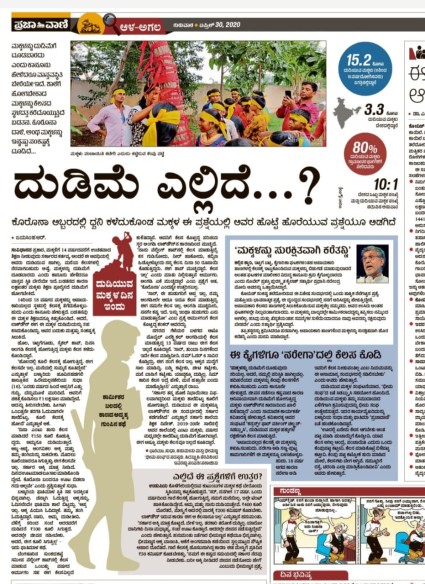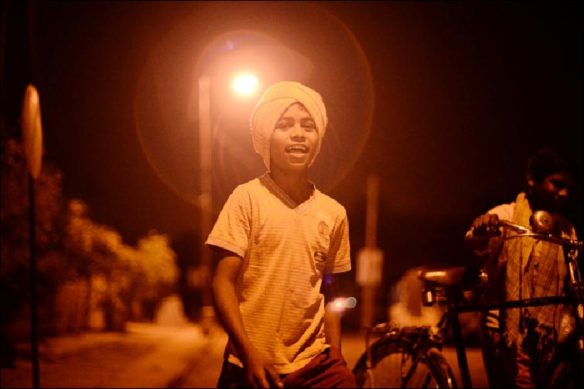On the occasion of the National Child Labour Day, April 30th, 2020: Listening directly to the concerns of members of Bhima Sangha, a union of working children and adolescents
Posted on April 30, 2020
On the occasion of the National Child Labour Day, April 30th, 2020: Listening directly to the concerns of members of Bhima Sangha, a union of working children and adolescents
Background: Thirty years ago, on April 30th of 1990, the Bhima Sangha, a union of working children and adolescents, chose 30th April, the day before Labour Day, as Child Labour Day. This day was chosen to draw attention to their existence in the workforce; their invisibilisation; their contributions; their demands for viable alternatives; their demands for safe work opportunities as adolescents as well as their aspirations for their communities and their country. Subsequently, this day was adopted by many working children’s unions, including the National Union of Working Children as the national child labour day. The Concerned for Working Children has facilitated Bhima Sangha since its inception.
Covid-19 and Bhima Sangha: The lockdown in Karnataka, India has brought to the fore agony, anguish, uncertainty and vulnerability of the most marginalised communities in our country, such as working children and adolescents. The scale of the horror they are collectively experiencing is unprecedented. The overall systemic cracks are showing up every day, as the most vulnerable are drastically hit. The medical, economic and social crises created by COVID-19 has taken on gigantic proportions due to unpardonable degree of lack of foresight, empathy, planning, coordination and commitment to the wellbeing of the most vulnerable of the citizens at the national level.
Working children and adolescents, even prior to Covid-19 have faced social and economic exclusion, structural discrimination, legislative apathy and negligence of the administration. They have fallen through the administrative security nets for ages and continue to do so during the pandemic as well. The State constantly under reports them as their presence indicates the failure of the State to provide for its youngest citizens. When their presence is noted, though legally they are listed under ‘children who are in need of care and protection’, in reality, they are approached as ‘children in conflict with law’. This is true also of adolescents, who are legally permitted to work in safe occupations. As a result of their criminalisation, the youngsters are very often ‘invisibilised’. During a pandemic such as Covid, these youngsters remain outside the remit of all programmes and support extended to children in schools. As their families are among the most vulnerable, they collectively face the brunt of inadequate basic facilities, lack of protection, zero income and enormous uncertainties. The vulnerability of all these youngsters is heightened right now, during the pandemic, and their post-Covid situation is likely to be even more so.
The organisation, CWC presently works in 12 localities of Bangalore City and 7 locations in Udupi Town in relation to children and adolescents who work. We are also coordinating with over 1,000 Panchayats and we are in touch with working children and adolescents who are in urban areas; who are migrants in transit; who are stuck in villages not of their origin; who are part of the reverse migration trend. Their hardships are numerous and challenges are daunting.
Sudha (16), a member of Bhima Sangha from Hiremalanakeri panchayat, Huvinahadagali taluk, Bellary district says, “I would go to the fields for agriculture labour work. Now there is no work due to the lockdown. My father has suffered a spinal cord injury when the ox suddenly bumped into him. We have had to take a loan of Rs. 1 Lakh to fund his treatment expenditure. As we need to repay that, I dropped out of school in Class 9 and started working. I work for 8 hours a day and earn Rs. 150/-. My mother works too. We have to take care of grandparents, a sister with a disability and my siblings. Earlier we would get our wages, but now there is no work. The Govt. has given us only free rice. We have incurred a loan to fund our ration expenses. Because of Corona, we cannot stop eating food, can we?” she questions.
Hanumanthu (17), a member of Bhima Sangha from the migrant labourers communities in Udupi city, says “I am 17 years old now. I have been going to construction labour work for a year now. We live in a tent here as we do not have a house to live in. My mother and I work for daily wages. Though we earn a wage of Rs. 400/-, the contractor takes away Rs. 200 as commission and we are left with only Rs. 200/-. We do not have work because of lockdown. Bheemanna, a member of the same Bhima Sangha as Hanumanthu, says, “The Govt. has given us only rice. There are no pulses and we do not have money to buy vegetables. Donors are giving us food in the morning and evening and we are getting on with our lives with the donation. I also have to give Rs. 50/- as commission to the contractor since I have newly joined as a daily wage labourer. The Govt. must support us during these hard times. How can we get on with our lives if only rice is supplied to us?” he questions! Such hard-hitting reality are shared by members of Bhima Sangha across Karnataka on the National Child Labour Day today, in the light of the impact that the National Lockdown has had on their lives. Read the article here. We thank the team at Prajavani for meaningful coverage.
Here is the coverage in Prajavani, depicting the struggles of working children across the state of Karnataka:



